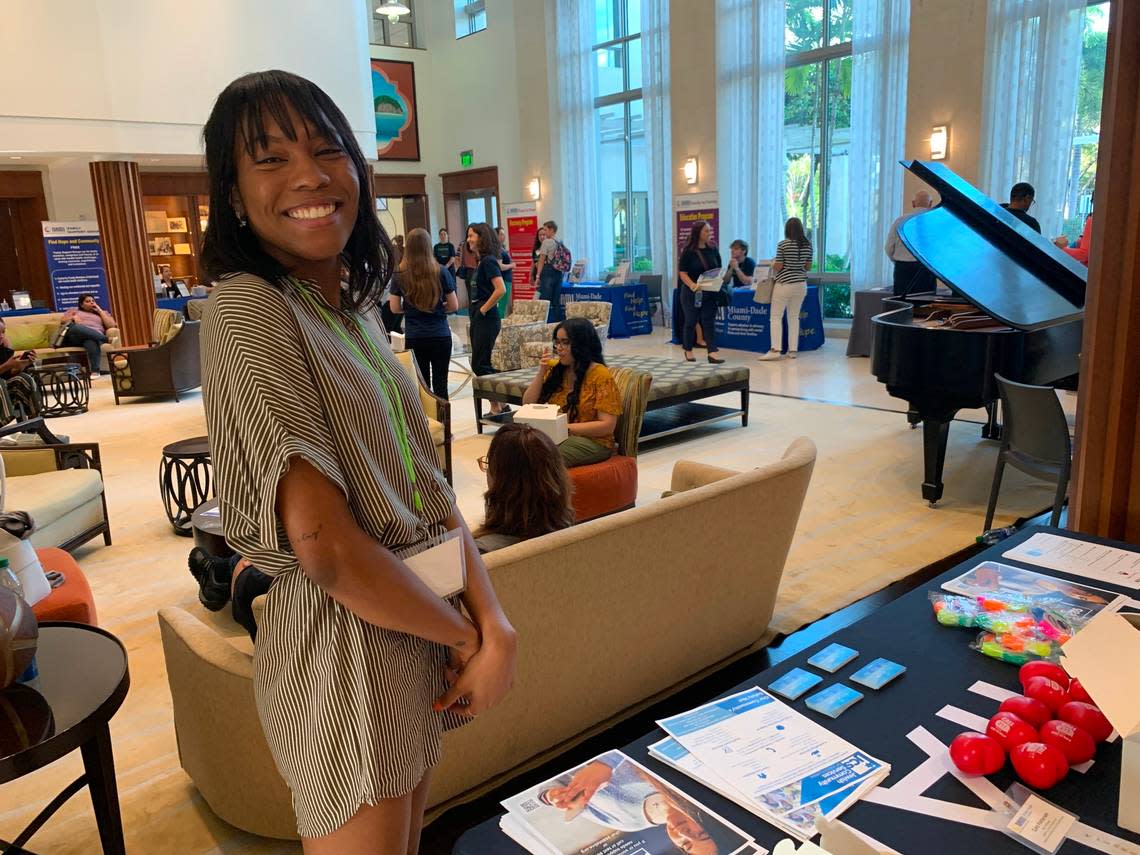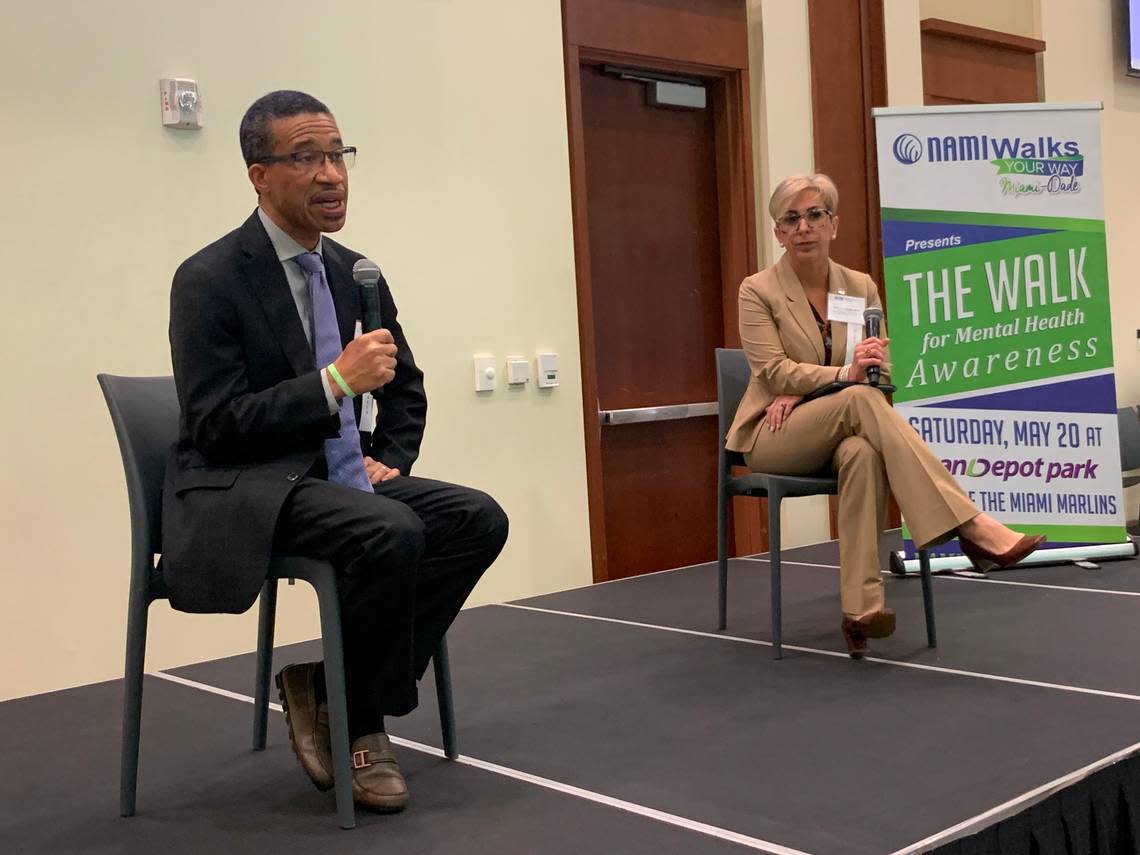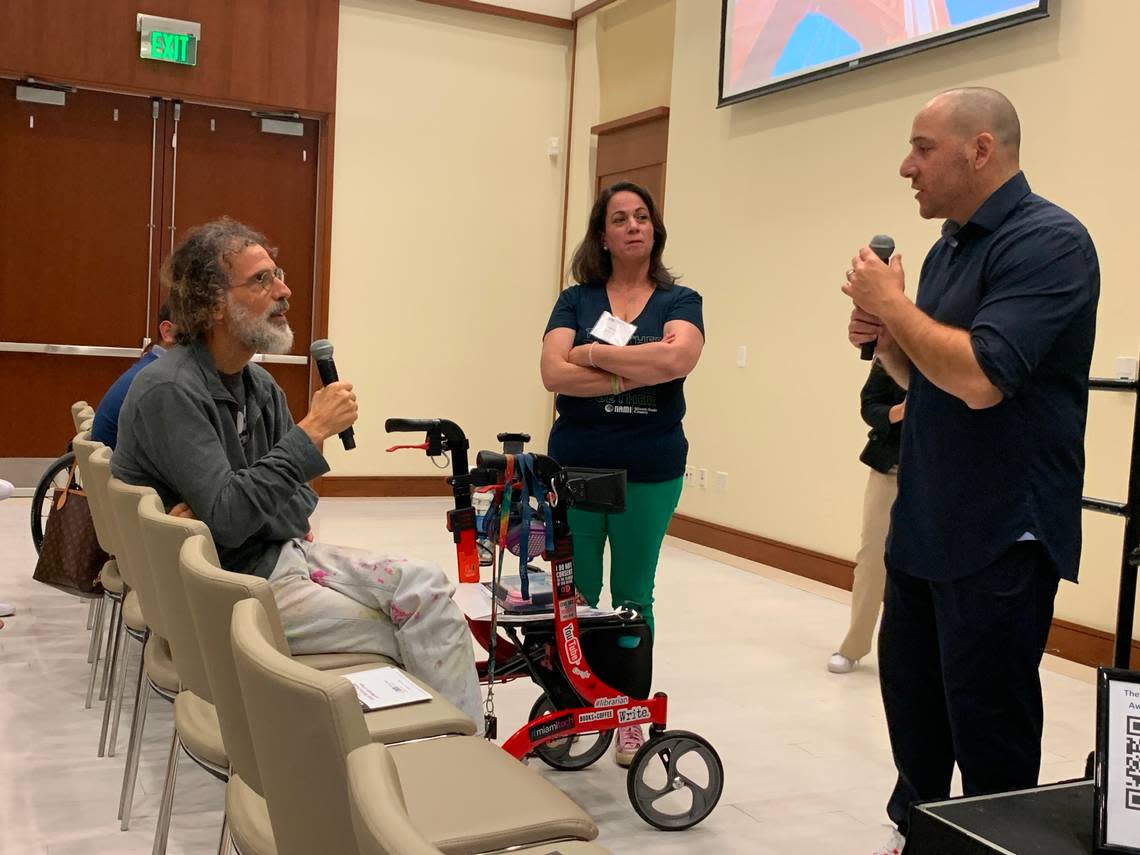She went from a ‘dark period’ in high school to preaching about suicide prevention
Mecca McCain remembers being as young as 11 when she first began cutting herself with a steak knife hidden in her bedroom.
The University of Miami junior remembers experiencing drastic mood swings, feeling sad, anxious and losing interest in activities, including her passion for fashion. She was one of a “handful of Black students at a predominately white, elite private school” in Washington and was not doing well in school. And, sometimes, she had suicidal thoughts.
“I wasn’t able to take care of myself, I had a really hard time, even getting out of bed to go to school in the morning, maintaining friendships. It was just a very, like, dark period for me,” said McCain, now 21. “And again, I didn’t know what it was, I didn’t know what to do. So, I kind of just kept everything to myself.”
Her mom, she said, saved her life by getting her started in therapy with a psychiatrist. Working with her mother, the physician admitted her to a psychiatric hospital during high school, where she began taking medications. She’s now a young adult presenter for the Miami-Dade chapter of the National Alliance on Mental Illness program “Ending the Silence,” a prevention and early intervention program for middle, high and college students.
“I went from thinking that I wouldn’t graduate high school to almost graduating UM ... I went from dealing with haunting thoughts of suicide ideation to become a suicide prevention instructor,” said McCain during a recent panel discussion at NAMI Miami-Dade’s first South Florida Suicide Awareness conference at the University of Miami.
The conference comes during a time when many teens and adults are contending with mental health challenges brought on by the disruptions and isolation of the pandemic. The issue is particularly acute among teen girls, who are experiencing record high levels of violence, sadness and suicide risk, according to a new Centers for Disease Control and Prevention report.

Teen girls experiencing increased sadness, CDC says
Nearly 3 in 5 (57%) U.S. teen girls “felt persistently sad or hopeless in 2021 — double that of boys, representing a nearly 60% increase and the highest level reported over the past decade,” the CDC says. The report, which came out in February, also found more than half of LGBTQ+ students had recently experienced poor mental health and that more than 1 in 5 attempted suicide in the past year.
In Miami-Dade County Public Schools, the importance of mental health was pushed to the forefront during the COVID-19 pandemic, with the school district working to identify at-risk students. Suicide is the second leading cause of death in children ages 10-14 and young adults ages 24-34, based on 2020 data, according to the CDC.
“They came back to us hurting and we’re still dealing with that fallout currently,” said Frank Zenere, a school psychologist and district coordinator for Miami-Dade Schools Crisis Program Division of the Office of Mental Health and Student Services.
Zenere said the school district is focusing on identifying at-risk students and is focused on preventing suicide through a variety of initiatives, including through mental wellness clubs. Partnering with NAMI and starting in September, all employees will receive two hours of suicide prevention training as part of the district’s efforts to become certified suicide prevention schools. The district also has a mobile response team and has contracted with mental health providers as part of its risk assessment and intervention strategy.
Suicide was the 12th leading cause of death in the United States in 2020; an estimated 1.2 million adults attempted suicide that year, the CDC says.
How to address mental health, reduce suicide in South Florida
In South Florida, some of the challenges involve breaking the stigma around mental illness, particularly among Black and Hispanic communities, and ensuring those who need treatment can get access to high-quality affordable care, said Dr. Stephen McLeod-Bryan, a University of Miami clinical associate professor and president-elect of the Black Psychiatrists of America and Dr. Patricia Junquera, interim chair and associate professor of the department of psychiatry and behavioral health at Florida International University.
“Our communities more often than not are overrun with alcohol, drugs, guns and lack of opportunities… The opportunities to gain access to treatment, mental health providers that can specifically help those who are suffering from depression, anxiety, psychosis is less available,” said McLeod-Bryan.

He said that many Black people who need help often are seen in emergency rooms because they don’t know where to go for help or were taken there by law enforcement. And while the suicide rate in Blacks is not as high as among whites, “The gap between Blacks and whites is shrinking and its shrinking fast,” he said.
There also needs to be more Spanish-speaking providers who ask specific questions to understand how patients are feeling, and more information disseminated in Spanish about the importance of mental health, said Junquera.
Outreach is also critical, experts say. NAMI Miami-Dade offers a variety of free programs, including peer support groups and QPR, which is a suicide prevention training. The organization is hosting a walk for mental health awareness at loanDepot park, the home of the Miami Marlins, on May 20.
And most importantly, people at risk need to get help quickly, said John Newcomer, president and chief executive of Thriving Mind South Florida and Joseph Parks, medical director of the National Council on Mental Wellbeing.
The country, for example, has seen success with last year’s roll-out of 988, a three-digit phone number that connects people experiencing suicidal thoughts, substance use, mental health crisis or emotional distress with trained crisis counselors via phone, text or chat. The free round-the-clock service, which was formerly known as the National Suicide Prevention Lifeline, saw a 45% increase in overall volume last year compared to August 2021.

The average speed to answer has now decreased from 2.5 minutes to 42 seconds, with 80% of problems resolved on the phone, experts said during the conference.
But 988 is like a “funnel” and is only part of the solution, said Parks. At the local level, communities need to develop a Behavioral Health Crisis System to connect police, fire, hospitals and other facilities that interact with people experiencing mental health crisis and examine data to create or improve response plans, he said. Newcomer said there will soon be four mobile response teams in Miami-Dade County, up from one.
“Waiting lists for service is a waiting list for the next crisis,” said Parks.
For NAMI Miami-Dade’s list of programs and resources, visit NamiMiami.org
